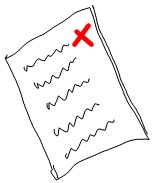Perverse incentives in assessment

Tools and ideas to transform education. Sign up below.
You are now subscribed
Your newsletter sign-up was successful

Marking, by Terry Freedman
What is a perverse incentive in assessment?
Some years ago I heard that a university had hit upon a great scheme to bring lagging students up to speed. If they failed an end-of-topic test they were given a set of notes to help them revise and correct their misconceptions. Those who passed the test were assumed to not need such revision aids, and so were given nothing.
Well, you can probably guess what happened next. The good students realised that they would be better off failing the tests than passing them. That way, they would be able to build up a huge ring binder full of revision notes without expending any effort whatsoever.
This is an example of what Dylan Wiliam, in an answer to a question I asked him at a recent conference, called a perverse incentive.
Help required – or not
The question I asked related to something I discovered while working at the Qualifications and Curriculum Authority, the on-screen test for assessing ICT capability. The main part of it was scenario-based, and we had built in help that would come on automatically when the computer program decided that the length of student inactivity was such that assistance was probably required. In some cases we found that the students who were not so good at ICT found the help intrusive, because it interrupted their thinking while they were writing notes on paper to work out their next steps. The better students, however, sometimes used the system to obtain further ideas about possible solutions.
Read more.
cross-posted at www.ictineducation.org
Tools and ideas to transform education. Sign up below.
Terry Freedman is an independent educational ICT consultant with over 35 years of experience in education. He publishes the ICT in Education website and the newsletter “Digital Education."
